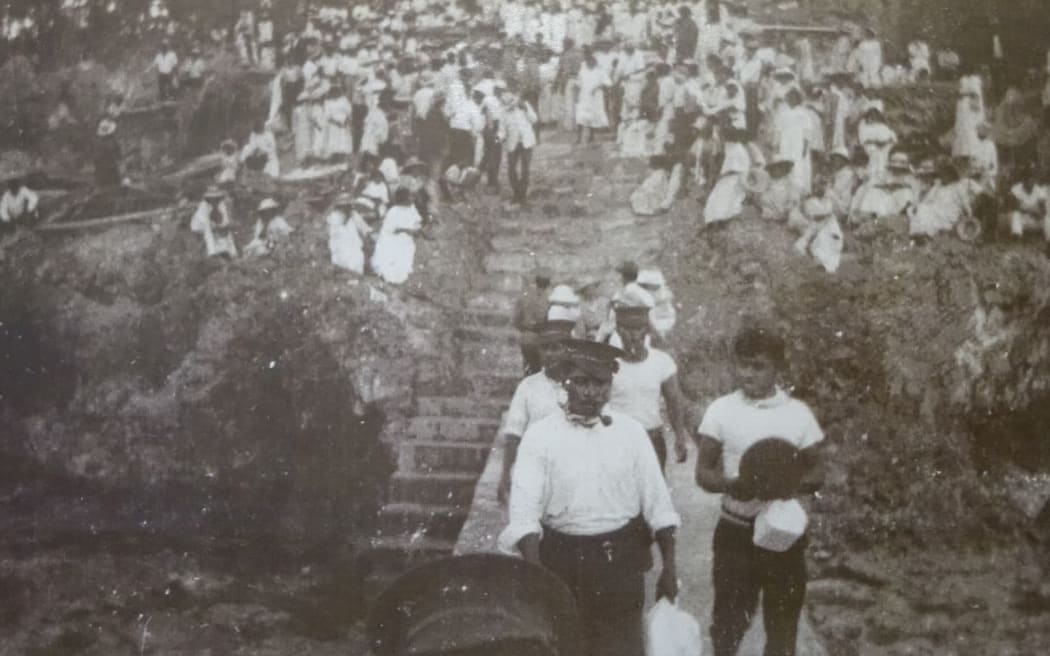Most of them had never worn shoes let alone marched in greatcoats on a cold, wet battlefield.
Most of them couldn't speak English.
In October 1915, 150 Niueans sailed with the New Zealand Maori Contingent to take part in a war they knew very little about.
The men served in Egypt and France but were withdrawn to England after increasing sickness.

Niuean men prepare to leave Niue for WW1 Photo: Supplied/Niue Taoga Museum
Niue had a population of about 4000 people at the time.
Among the volunteers were four brothers of the Hipa family and only one of them, Tipae Hipa, returned.
His great grandaughter Rozlyn Hipa said it was a devastating loss for the family.
"It's unheard of now, for four family members to all go to war at the same time. That's a big number, you know, when you look at per capita," she said.
"When you look at how many people lived in Niue in those days, that's huge."
Ms Hipa said her great great uncles were among those who got sick and died.

Three of the four Hipa brothers who went to WW1. From L to R Corporal Sipae Hipa, Sergeant Pulu Hipa and Private Peni Hipa Photo: Supplied by Hipa family
"Niueans who went to war had never experienced winter ever in their lives. The majority of them actually died of pneumonia or some simple thing as a flu.
"They've never worn shoes, they didn't know what it was like to wear these layers of clothing, so the exposure to the cold, I think, was one of the huge contributing factors to a lot of the Niueans who perished in that war."
Two of the brothers Pulu and Peni were buried at sea and Hemu was buried at the Karori Cemetery in Wellington.
Researcher Margaret Pointer found that by April 1916, 52 percent of the Niuean soldiers were hospitalised abroad due to illness and five were buried at sea.
Another 15 died within five years of their return to Niue.
"Niue's very first casualty of the war died in Auckland on the 25th of December 1915," said the Director of Niue's Taoga Museum, Moira Enetama.
"The wife and the family did not learn of his passing until six months later, so I don't think they took seriously those issues just like before they left to go to war."
The museum has a small collection of war memorabilia, including photos and a WW1 uniform, salvaged after Cyclone Heta destroyed the museum in 2004.

Photos of Niue's WW1 soldiers salvaged after Cyclone Hipa at Niue's Museum Photo: RNZI/Indira Stewart
Last year some delegates from Niue were invited to Europe for First World War commemorations.
Rozlyn Hipa said it was an insult no one from her family was selected to go.
"Here's parents with four sons taken away. That's a huge contribution to the war," she said.
"Name me a family in this day and age who will send their four sons at the same time to war. I don't think anybody will ever, ever do that, so, for a family to sacrifice four sons to the one war, they should be recognised more than they do."
Ms Enetama said the New Zealand government was working to make up for past lack of recognition for Pacific soldiers.
"I think we were left behind without that recognition, the due recognition to the people of Niue at the time and with this 100 years' celebration .... they're trying to mend the relationship forward."
It's still not known where many of the men are buried but Ms Enetama said efforts were underway to find out and to make sure all are acknowledged.

Moira Enetama, Director of Niue Taoga Photo: RNZI/Indira Stewart


